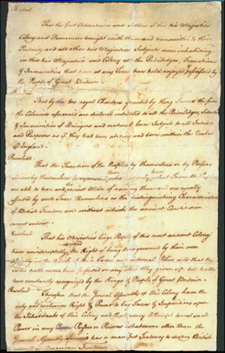Patrick Henry and the Stamp Act Resolves

Draft of Patrick Henry's Stamp Act Resolves
The most virulent of the colonial reactions to the Stamp Act were the seven resolves introduced by Patrick Henry in the Virginia House of Burgesses on May 29, 1765. Their strong denial of Parliament's authority to tax the colonies was not new, even in Virginia—the assembly's 1764 resolves powerfully made the same argument. Henry's twist was his use of radical language that average colonials could understand and support—and which moderate Virginians, such as Peyton Randolph and Landon Carter, opposed as harmful to their aims. Henry's fifth resolve was the most disconcerting. It declared that "every Attempt to vest" the power of taxation anywhere but the Virginia assembly "has a manifest tendency to destroy British as well as American Freedom." Five of the seven resolves narrowly passed on May 30 (although the most politically problematic of the successful resolves—the fifth—was expunged from the House's journal the next day, after Henry's departure, so that it could not be used as a precedent). Francis Fauquier, Virginia's lieutenant governor, described them to his London superiors as "violent Resolutions" but they were only "the effect of heat in the few Members of the Assembly present."
The other colonies experienced Henry's resolves rather differently than did the members of the Virginia House of Burgesses and without regard to those that actually passed the House or that remained on its records. In Rhode Island, the Newport Mercury printed six of the resolves on June 24, 1765. All seven were printed by the Boston Gazette (on July 1) and the Maryland Gazette (on July 7), given the false impression that Virginia's actions were more radical than in fact they had been. In Massachusetts Bay, its governor, Sir Francis Bernard, wrote that Henry's resolves sounded "an alarm bell to the disaffected."









